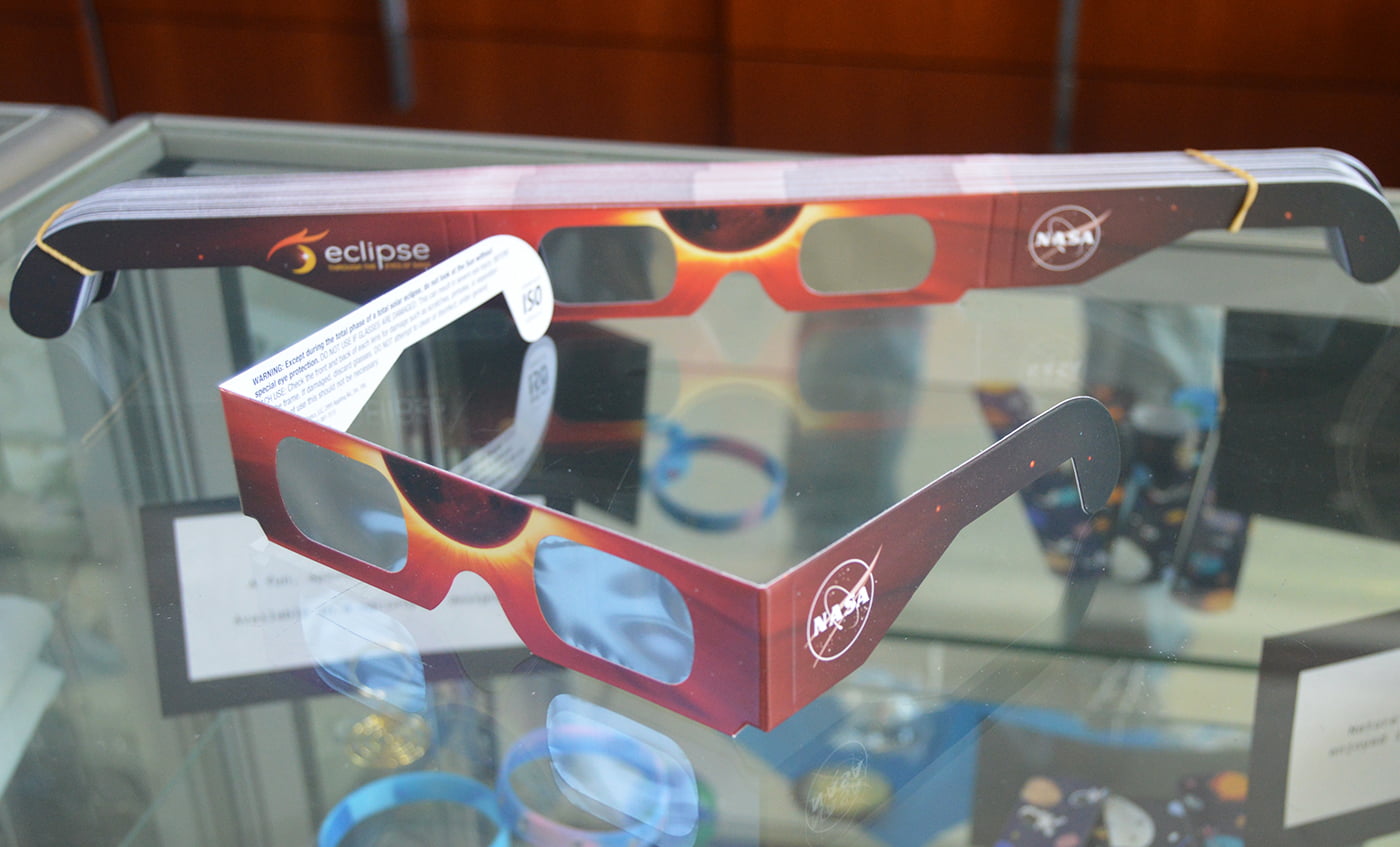Life Sciences Building, Room 206
501 S. Nedderman Drive
Box 19047
Arlington, TX 76019
NASA grant to provide free eclipse-safe glasses for Planetarium field trips

A NASA grant is providing free eclipse-safe glasses for K-12 students and teachers who attend field trips to the UTA Planetarium, which provides exciting and educational astronomy programs for thousands of schoolchildren each year.
The NASA grant was awarded to Liwei Zhang, assistant professor of mechanical and aerospace engineering in the College of Engineering, for the project, “Rotating Detonation Rocket Engines for In-Space Propulsion: Integrating Technology Development with STEM Engagement”, which she leads.
Zhang received 20,000 pair of eclipse-safe glasses from NASA and the Planetarium is giving a free pair to every student and teacher who attends a Planetarium field trip. The Planetarium started the program in early October and it will continue until all the glasses have been distributed.
“This is a wonderful way that we can thank the schools who bring field trips to the Planetarium and also spur students’ enthusiasm for astronomy and science in general,” said Levent Gurdemir, Planetarium director. “I would like to thank Dr. Zhang for making this giveaway possible and for helping the Planetarium further its educational mission.”
The Planetarium will host a viewing party for the annular solar eclipse that will be visible in parts of Texas on Saturday, October 14. The event will begin at 10:30 a.m. on the plaza outside the Planetarium. The eclipse will be partially visible in Arlington. A total solar eclipse will occur on April 8, 2024, and the DFW Metroplex will be the prime viewing location. Large numbers of visitors from around the country are anticipated for that eclipse, and the Planetarium and UTA are planning a series of events.
“The Department of Physics and the Department of Mechanical and Aerospace Engineering at UTA are developing high-profile programs in space-related science and technology,” Zhang said. “As we expand our research efforts, it will be important to engage students and our community as a whole. These eclipse-viewing events will provide an excellent opportunity to introduce our academic programs to K-12 and college students.”
More information can be found at the UTA Planetarium’s eclipse website at https://www.uta.edu/planetarium/eclipse.
Central Market award to provide field trips for economically disadvantaged schools
The UTA Planetarium has received a $10,000 grant from the Central Market Community Investment program to cover field trip admission fees to Planetarium shows for Title 1 schools with significant numbers of economically disadvantaged students.
The grant is the third provided to the Planetarium by Central Market for this purpose. The first came during the COVID-19 pandemic in early 2021 and helped the Planetarium provide virtual field trips to K-12 students.
“This generous grant from Central Market will help ensure that the outstanding educational resources provided by the Planetarium are available to all students, regardless of economic status,” Gurdemir said.
Park Central Observatory Ribbon-Cutting Set for October 31
The Park Central Observatory, located atop the Park Central Garage at 500 S. Center Street on the northeast side of campus, has been in operation since 2021, but the interior of the facility was only recently completed.
The Planetarium will host a ribbon-cutting ceremony to celebrate at 2 p.m. on Tuesday, October 31. College of Science Dean Morteza Khaledi, and faculty and staff from the Planetarium and the Department of Physics will be among those in attendance. The event is open to the public.
The Observatory is designed to provide spectacular views of the Moon, Solar System, and deep space objects for students and the public, in addition to teaching students about gathering and processing scientific data from the sky. The Observatory’s unique location allows hosting large night classes, public star parties and viewing nights with plenty of parking available. The UTA Observatory is the only facility in the Dallas/Fort Worth area to offer public viewing programs.
The Observatory’s motorized dome structure features a fully automated 16-inch LX200GPS Meade Schmidt-Cassegrain telescope, as well as optical filters, an auto guiding system, a weather station and an astronomical grade camera, which creates a direct video feed to UTA’s Planetarium. In addition to Planetarium use, the observatory is utilized by astronomy and astrophysics classes and labs.
“The Park Central Observatory is a great resource for the Planetarium, the Department of Physics, and UTA,” Gurdemir said. “Our telescope allows for excellent views of the Moon, the planets, and stars. It is great to see visitors come and enjoy the chance to look at the wonderful things the sky has to offer.”
The Planetarium has previously hosted several public events at the Observatory and plans more in the coming months. The next event will be the evening of Friday, Oct. 21 to celebrate International Observe the Moon Night.
--The UTA College of Science, a Carnegie R1 research institution, is preparing the next generation of leaders in science through innovative education and hands-on research and offers programs in Biology, Chemistry & Biochemistry, Data Science, Earth & Environmental Sciences, Health Professions, Mathematics, Physics and Psychology. To support educational and research efforts visit the giving page, or if you're a prospective student interested in beginning your #MaverickScience journey visit our future students page.